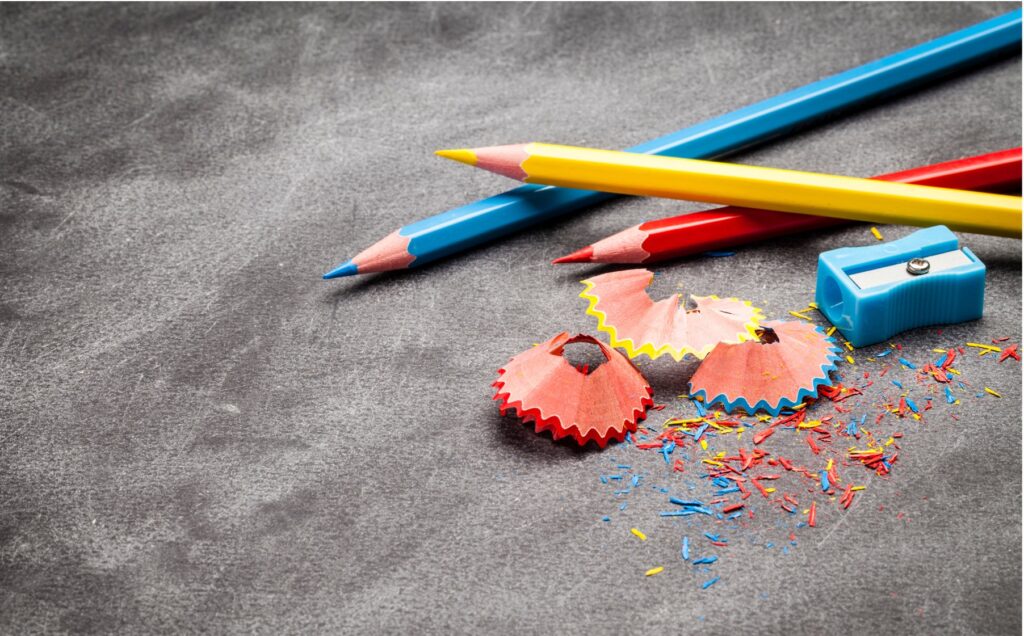
When I was a new teacher, I found the loss of classroom supplies maddening and infuriating. In particular, pencil loss ticked me off on a daily basis. I would loan out pencils every day, and they would just disappear, into the oblivion, never to be seen again.
I would remind students that it was not their property, that it was a loan, that it was technically stealing if the pencils were not brought back. I would find myself talking about the pencils on a daily basis because there was almost always a student without one. I was under the impression that if the students understood the importance of classroom supplies, they would change their behavior.
Still, the pencils disappeared.
I tried all kind of handy tricks to keep them around. Kids had to surrender a shoe if they borrowed a pencil. They would have to write their name on the board. My name was etched on the side of the pencil. I crafted cut little flags and attached them to the top of pencils. I even handed out passes that would earn each student a point on their average if they avoided asking for a pencil. This technique was shot down by my principal. (In hindsight, he had a good reason for this, although I fought him fiercely at the time.)
Still, the pencils disappeared.
A few years ago, I gave up. Not because I felt defeated, but because I realized that it was a waste of my time and effort. There were reasons students didn’t have pencils. A few of my students each year came from situations so poor and so chaotic that I realized that I should be glad if their hair was brushed, and they were wearing shoes. Some of them were just forgetful and
In reality, most of my students came to class with a writing utensil of some sort. About 90% of my students were prepared on a daily basis. Eventually, I realized that I spending too much time focusing on what students didn’t have. I was feeding negative energy into the classroom through that focus, and I was tired.
Every time I discussed the issue of a forgotten pencil with a student I spent at least one minute of that classes’ time with that discussion. Usually, the same students came unprepared, so I was having that conversation on almost a daily basis. Reflecting on the time spent, I realized that even if I only had “the conversation” once a day, I was spending almost a week of one class during the school year just discussing pencils! This had to stop.
I decided I would do what had been previously unthinkable – I would start giving out pencils freely, with no strings attached (literally or figuratively). I set a pack of pencils in the back of my room. I left a few tiny disposable sharpeners there also. Most of the students still came prepared, and a few would wander back there during the day to grab a pencil if needed. Some turned them back in, and some didn’t.
Starting the Class with a Positive Energy
Immediately I noticed a difference. I wasn’t having “the conversation” at the beginning of class each day. I could start class with positive energy, and I could tell that my spirit was actually brighter. I had never realized how much mental energy I had spent on those pencils. I decided to expand on this premise. I cleared off my back shelves that spring. Binders would now be kept in the classroom! Current papers needed to go home, but as each unit ended, papers were added to the binder. There were a few students that needed help with organization, but in large part, the binders were in better shape because they weren’t being crammed into lockers every period. (I’ve written more about my binder organization system also.)
At this point, I’m sure you’re questioning my teaching. Shouldn’t I be teaching responsibility? How will the students learn that they have to come prepared if I don’t teach preparation on a daily basis? As I noted previously, 90% of my students were coming to class prepared. Further, the rest of the students will get there with responsibility. Not all of them are there yet – that’s okay. I’d rather highlight those who are prepared than spend my time and energy on those who aren’t. I was actually really horrible at coming to class prepared in grade 7 myself. Still, I did figure out how to be responsible.
Pencils may be a bigger deal in your classroom. You might teach in a high poverty district where all of your students come with nothing. You might need to expel energy towards the pencil situation because it’s necessary for you to teach. I get that. Still, I ask you to think about the classroom experience for your kids. We only have a certain amount of time with our students, and we definitively only have a certain amount of energy to utilize.
Are you wasting moments of your day on the little stuff? How might you be missing the bigger picture? Feel free to add your thoughts in the comment section below.
